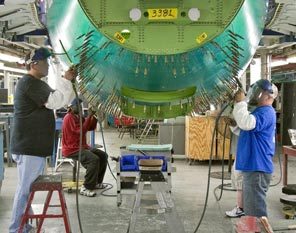Boeing issues mount
 Former employees say production defects in Boeing planes have been systematically ignored.
Former employees say production defects in Boeing planes have been systematically ignored.
Ex-Boeing staff have told reporters that their repeated alerts about production flaws fell on deaf ears.
The aircraft manufacturer, already scrutinised after a panel on a 737 MAX 9 blew off mid-flight, faces further inspection with the US aviation regulator, the Federal Aviation Administration (FAA), announcing an audit of the 737 MAX production.
Whistleblowers have depicted a company culture prioritising production speed over quality and safety.
Despite the focus on the 737 MAX's software issues, insiders point to pervasive manufacturing and quality control problems. Recently, Alaska Airlines discovered loose bolts and fixings in near-new MAX 9 planes, underscoring these concerns. The Wall Street Journal reported that essential bolts were missing from the Alaska Airlines jet that experienced the cabin blowout.
More recently, the company has warned of delivery delays after it was found that holes were not drilled correctly on some 737 jets.
One insider said he had warned about defective oxygen masks as early as 2016, a claim substantiated by an FAA investigation. His whistleblower complaint to the FAA in 2017 highlighted the non-functioning emergency oxygen systems, but no decisive action was taken.
Aviation consultants have traced Boeing's issues back to its merger with McDonnell Douglas two decades ago, suggesting a shift from an engineering-driven culture to one focused on accounting and management.
Boeing's hasty response to Airbus's new plane release, leading to the problematic MCAS software in the 737 MAX, is up for criticism too.
But issues are not limited to the plane-maker, with FAA employees criticising the regulator's close ties with Boeing, and arguing for a more assertive regulatory role.
The recent FAA actions, including an audit and increased monitoring of Boeing's quality oversight, appear to be a response to these longstanding issues.
Australian airlines, including Virgin and Bonza, which operate MAX 8s, and Qantas, with various Boeing and Airbus aircraft, have not commented on these developments.
However, Qantas has stated its commitment to working closely with manufacturers and safety regulators.
In a significant move, Boeing will withdraw a request for a safety exemption for its upcoming 737 MAX 7 jet.
This decision follows intense pressure and scrutiny after the recent safety incidents, signalling an acknowledgement of the need for stringent safety measures.







 Print
Print